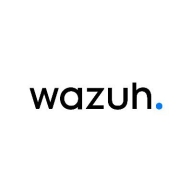

Wazuh and Cribl compete in the cybersecurity solutions category, each with unique strengths. Wazuh offers open-source benefits and integration versatility, while Cribl excels in real-time data management and cost-efficiency, giving it an upper hand in data transformation tasks.
Features: Wazuh provides strong compliance support, vulnerability detection, and cloud-native SIEM features, making it highly versatile for integration across platforms like AWS. Cribl specializes in real-time data transformation and flexible data routing, ensuring efficient handling of high data volumes while maintaining cost-effectiveness.
Room for Improvement: Wazuh could enhance its threat intelligence and real-time monitoring, especially for Unix systems, and improve AI capabilities. Cribl needs more comprehensive features for smaller firms and a better integration with enterprise products. Improving data storage features and versioning system would also benefit larger data set management.
Ease of Deployment and Customer Service: Wazuh's open-source nature improves deployment flexibility across on-premises and hybrid cloud environments but limits direct support, relying on community help. Cribl, focused on on-premises deployments, compensates for its limited direct support with strong community resources, and offers real-time feedback that aids fast implementation.
Pricing and ROI: Wazuh benefits from being open-source with no initial licensing fees, reducing upfront costs but potentially increasing total ownership costs. Cribl provides a standardized pricing model, generally less expensive than competitors such as Splunk, and offers a substantial ROI through efficient data processing and lower licensing expenses.
What we've seen is really an overall reduction of just shy of 40% in our ingest into our SIM platform versus prior to having Cribl.
In terms of reduction, we were able to save almost ~40% of our total cost.
In the case of optimization, it has helped return on investment to somewhere close to 50%.
I have seen value in security cost savings with Wazuh, as using proprietary EDR versions could save us substantial money.
They had extensive expertise with the product and were able to facilitate everything we needed.
Usually, within an hour, we get a response, and we are able to work with them back and forth until we resolve the issues.
If they could enhance their internal logging, we won't require Cribl support to engage.
They responded quickly, which was crucial as I was on a time constraint.
We use the open-source version of Wazuh, which does not provide paid support.
The documentation is good and provides clear instructions, though it's targeted at those with technical backgrounds.
The infrastructure behind Cribl Search is also scalable as it uses a CPU and just spawns horizontally more instances as it demands and requires.
It's an enterprise version, and we have a good amount of users using this solution.
I don't need to talk to a Cribl engineer to connect a new log source.
It can accommodate thousands of endpoints on one instance, and multiple instances can run for different clients.
Currently, I don't see any limitations in terms of scalability as Wazuh can still connect many endpoints.
Scalability depends on the configuration and the infrastructure resources like compute and memory we allocate.
Migrating from those SC4S servers to Cribl worker nodes has truly been a game-changer.
I would rate the stability as ten out of ten.
If the pipeline is down and we receive an alert that it's not sending information to the log collection platform for more than one or two hours, if we receive an alert, it would be great.
The stability of Wazuh is strong, with no issues stemming from the solution itself.
The stability of Wazuh is largely dependent on maintenance.
The indexer frequently times out, requiring system restarts.
If we can have more internal logs and more debug logs to validate the error, that would be beneficial because instead of reaching out to Cribl support, we can troubleshoot and find the root cause ourselves.
In terms of large datasets—whether they originated from network inputs, virtual machines, or cloud instances—ingesting the data into the destination was relatively easy.
Since Cribl is such a large platform with numerous features, having a clear, structured approach would make it easier for me and others to understand and utilize its capabilities.
Machine learning is needed along with understanding user behavior and behavioral patterns.
The integration modules are insufficiently developed, necessitating the creation of custom integration solutions using tools like Logstash and PubSub.
I think Wazuh should improve by introducing AI functionalities, as it would be beneficial to see AI incorporated in the threat hunting and detection functionalities.
Over time, the licensing cost has increased.
Cribl is very inexpensive, with enterprise pricing around 30 cents per GB, which is really decent.
They have a universal license that allows us to consume the portions of Cribl that we want to use or flex into other portions of Cribl.
Wazuh is completely free of charge.
I would definitely recommend Wazuh, especially considering Fortinet's licensing model which is confusing and overpriced in my opinion.
Totaling around two lakh Indian rupees per month.
The data reduction and preprocessing capabilities make Cribl really unique.
Cribl has a feature called JSON Unroll or Unroll function that allows you to differentiate the events; each event will come ingested as a single log instead of piling it up with multiple events.
The Cribl UI is very simple and easy to use, particularly when working with data from various sources; it makes it very easy to create pipelines, add complex logic to those pipelines, and then gives you a preview of what your data looks like before applying that pipeline and what you get after.
Wazuh is a SIEM tool that is highly customizable and versatile.
The system allows us to monitor endpoints effectively and collect security data that can be utilized across other platforms such as SOAR.
With this open source tool, organizations can establish their own customized setup.
| Product | Market Share (%) |
|---|---|
| Wazuh | 10.2% |
| Cribl | 1.2% |
| Other | 88.6% |


| Company Size | Count |
|---|---|
| Small Business | 9 |
| Midsize Enterprise | 5 |
| Large Enterprise | 14 |
| Company Size | Count |
|---|---|
| Small Business | 26 |
| Midsize Enterprise | 15 |
| Large Enterprise | 8 |
Cribl offers advanced data transformation and routing with features such as data reduction, plugin configurations, and log collection within a user-friendly framework supporting various deployments, significantly reducing data volumes and costs.
Cribl is designed to streamline data management, offering real-time data transformation and efficient log management. It supports seamless SIEM migration, enabling organizations to optimize costs associated with platforms like Splunk through data trimming. The capability to handle multiple data destinations and compression eases log control. With flexibility across on-prem, cloud, or hybrid environments, Cribl provides an adaptable interface that facilitates quick data model replication. While it significantly reduces data volumes, enhancing overall efficiency, there are areas for improvement, including compatibility with legacy systems and integration with enterprise products. Organizations can enhance their operational capabilities through certification opportunities and explore added functionalities tailored towards specific industry needs.
What are Cribl's most important features?Cribl sees extensive use in industries prioritizing efficient data management and cost optimization. Organizations leverage its capabilities to connect between different data sources, including cloud environments, improving both data handling and storage efficiency. Its customization options appeal to firms needing specific industry compliance and operational enhancements.
Wazuh offers comprehensive security features like MITRE ATT&CK correlation, log monitoring, and cloud-native infrastructure. It ensures compliance and provides intrusion detection with high scalability and open-source flexibility, ideal for businesses seeking robust SIEM capabilities.
Wazuh stands out in security information and event management by providing efficient log aggregation, vulnerability scanning, and event correlation against MITRE ATT&CK. Its capability to integrate seamlessly with environments, manage compliance, and monitor files makes it suitable for cloud-native infrastructures and financial sectors. Despite its technical support needing enhancement and opportunities for improving AI integration and threat intelligence, its open-source nature and cost-effectiveness make it appealing. Users can leverage custom dashboards powered by Elasticsearch for precise data analysis, even though there is a desire for a more user-friendly interface and better enterprise solution integration. Deployment may be complex, but its features contribute significantly to fortified security postures.
What are the essential features of Wazuh?Industries like finance and cloud infrastructure heavily utilize Wazuh for its security strengths. By monitoring endpoints and ensuring compliance with frameworks, companies can improve security posture and swiftly detect anomalies. The platform's focus on event correlation and alerts for security incidents is particularly beneficial.
We monitor all Security Information and Event Management (SIEM) reviews to prevent fraudulent reviews and keep review quality high. We do not post reviews by company employees or direct competitors. We validate each review for authenticity via cross-reference with LinkedIn, and personal follow-up with the reviewer when necessary.